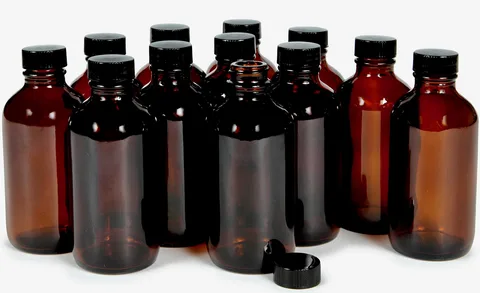In a world where the integrity of our products is paramount, light-sensitive items often face an invisible enemy—UV rays. These harmful wavelengths can degrade and compromise everything from essential oils to pharmaceuticals. The need for proper storage solutions has never been more critical. Enter amber glass bottles, a simple yet effective answer to safeguarding your valuable products against the dangers of light exposure.
With their rich colour and sturdy design, these bottles look appealing and serve as a formidable barrier against UV radiation. Understanding why these containers are ideal for light-sensitive goods can make all the difference in maintaining product quality and efficacy over time. Let’s delve into what makes Amber-Glass Bottles stand out in today’s packaging landscape!
What are Amber-Glass Bottles and why are they beneficial?
Amber-Glass Bottles are specifically designed to protect sensitive contents from light exposure. Their rich, dark hue protects against harmful ultraviolet rays that can degrade certain products over time. These bottles are commonly used for packaging essential oils, pharmaceutical items, and various cosmetic formulations. The versatility of amber glass makes it an attractive option across multiple industries.
One key benefit is their non-reactive nature. Unlike plastic containers, which may leach chemicals into the product when exposed to heat or sunlight, amber glass maintains purity without compromising quality. Additionally, these bottles offer a premium aesthetic appeal. Many consumers associate amber packaging with high-quality goods, making them more likely to trust what’s inside. This combination of functionality and perception sets amber glass apart in storage solutions for light-sensitive products.
The science behind amber glass and its ability to block harmful UV rays
Amber glass is more than just an aesthetic choice; it’s a scientific marvel designed to protect sensitive products. The deep, rich amber glass hues come from adding specific metal oxides during its manufacturing process. These additives absorb and filter out harmful ultraviolet (UV) rays that can degrade valuable contents. Unlike clear glass, which allows nearly all light waves to pass through, amber glass protects against UV radiation.
This shielding effect is crucial for preserving the potency of essential oils, pharmaceuticals, and certain food items. Prolonged exposure to light can lead to oxidation and chemical breakdowns in these products. Manufacturers ensure their offerings maintain quality over time while extending shelf life by using Amber-Glass Bottles. This unique combination of beauty and functionality makes amber glass an exceptional choice for light-sensitive applications.
Comparison with other packaging materials (plastic, clear glass, etc)
Regarding packaging light-sensitive products, not all materials are created equal.
Although plastic may be lightweight and versatile, it often fails to provide adequate protection against harmful UV rays. Over time, sunlight can degrade the contents inside.
Clear glass offers a classic look but lacks the protective qualities needed for sensitive items. Light quickly penetrates clear glass, leading to potential spoilage or diminished quality.
Amber glass stands out in this comparison. Its unique coloration effectively blocks significant UV radiation while allowing visible light. This balance ensures that products remain potent and viable longer.
Additionally, amber glass is recyclable and contributes less waste than many plastic alternatives. With sustainability becoming increasingly vital in packaging choices, it’s essential to consider how different materials impact product integrity and the environment.
Industries and products that can benefit from using Amber-Glass Bottles
Amber-Glass Bottles are increasingly popular across various industries. They are particularly beneficial in the cosmetics sector, where essential oils, serums, and lotions require light exposure protection to maintain efficacy.
Amber glass is ideal for storing products like beer or herbal tinctures in the food and beverage industry. These items can suffer flavour degradation when exposed to UV rays.
Pharmaceutical companies also value amber packaging. When stored in these protective containers, medications that are sensitive to light can remain stable longer.
Amber bottles also extend the shelf life of natural health products such as vitamins and supplements. The robust design helps prevent contamination while safeguarding precious ingredients from harmful sunlight.
From artisanal brands to large manufacturers, many recognise the advantages of using amber glass for light-sensitive goods.
Tips for properly storing and handling light-sensitive products
To maximize the protection of light-sensitive products stored in Amber-Glass Bottles, they should be kept away from direct sunlight. This will significantly reduce any potential degradation.
- Maintain a consistent temperature in storage areas. Extreme fluctuations can affect product integrity, even within amber containers. A relaxed environment is ideal.
- Handle the bottles carefully to avoid breakage or damage that could compromise their contents. Always use clean hands or gloves when touching them to prevent contamination.
- Label each bottle clearly with important information about its contents and storage needs. This helps you manage inventory effectively while ensuring safety protocols are followed.
If transferring products into smaller containers for use, do so quickly and minimize exposure to light during the process. These simple tips will help maintain your product’s quality over time.
Cost-effectiveness and sustainability
Amber-Glass Bottles offer a cost-effective solution for businesses aiming to protect their products. While the initial investment may be slightly higher than plastic alternatives, the long-term benefits are undeniable. These bottles preserve product integrity by blocking harmful UV rays, reducing waste from spoilage and damaged goods.
In terms of sustainability, amber glass is recyclable and reusable. Unlike many plastics that contribute to landfill issues, glass can be melted down and repurposed endlessly without losing quality. This environmentally friendly aspect appeals to eco-conscious consumers.
Moreover, using amber glass enhances brand perception. Customers often associate high-quality packaging with premium products. By choosing these bottles, companies safeguard their contents and align themselves with sustainable practices that resonate in today’s market landscape.
Protect Your Product Quality with Amber-Glass Bottles
Light-sensitive products require special attention to maintain their efficacy and quality. Amber-Glass Bottles are a reliable choice for this purpose.
These bottles provide a protective barrier against harmful UV rays and help preserve the integrity of essential oils, vitamins, and other sensitive substances. When stored in amber glass, these products remain potent for more extended periods.
The opaque nature of amber glass prevents degradation caused by light exposure, ensuring that formulations retain their color, aroma, and nutritional value.
Additionally, amber glass is non-reactive. It won’t leach harmful chemicals into your product like some plastic materials can over time.
Choosing the proper packaging is crucial for maintaining product quality from production to shelf life. Opting for Amber-Glass Bottles is a smart step toward ensuring your offerings meet consumer expectations while standing out on the market.
What are Amber-Glass Bottles and how do they work?
Amber-Glass Bottles are specially designed containers made from a distinct, dark-tinted glass. This rich amber colour is not just for aesthetics; it serves a vital purpose. The primary function of these bottles is to protect sensitive contents from exposure to light, particularly ultraviolet (UV) rays. UV radiation can degrade many products, altering their effectiveness and quality.
When light hits an amber bottle, the pigments in the glass absorb harmful wavelengths. This filtration process ensures that only safe light levels reach the product inside. Commonly used for essential oils, pharmaceuticals, and certain food items, amber glass offers both protection and preservation. Its durability adds another layer of security against breakage while maintaining an appealing look on store shelves or countertops.
Benefits of using Amber-Glass Bottles for light-sensitive products
Amber-Glass Bottles offer a myriad of advantages for light-sensitive products. Their deep hue is a natural barrier against harmful UV rays, safeguarding the integrity of contents like essential oils, pharmaceuticals, and certain cosmetics.
- This protective quality helps maintain potency and prolongs shelf life. When stored in amber glass, products are less likely to degrade or lose effectiveness over time.
- Moreover, amber glass is chemically inert. This means it won’t react with sensitive substances inside the bottle. Amber glass ensures purity, unlike plastic containers, which can leach chemicals into their contents.
- The aesthetic appeal also cannot be overlooked. Amber bottles exude sophistication and professionalism while presenting your product attractively on shelves.
Environmentally conscious consumers appreciate that these bottles are also recyclable and reusable options. They align perfectly with growing sustainability trends without compromising on functionality or style.
Other types of packaging for light-sensitive products and their drawbacks
Several options exist for packaging light-sensitive products, but not all offer the same level of protection. Clear glass is often considered aesthetically pleasing, but it allows harmful ultraviolet (UV) rays to penetrate easily, leading to degradation and loss of potency in sensitive formulations.
Plastic containers are lightweight and convenient, yet they have their issues. Many plastics can leach chemicals into products over time or lose structural integrity when exposed to heat and sunlight. This potential for contamination poses significant risks.
Opaque materials might block visible light but can still allow UV radiation through unless specifically designed for that purpose. Not all opaque solutions provide a complete barrier against damaging wavelengths. Choosing the proper packaging is crucial for maintaining product efficacy; relying on alternatives may compromise quality.
Tips for choosing the right amber glass bottle for your product
Choosing the right amber glass bottle starts with understanding your product’s needs. Consider its volume and type—different products require different sizes and shapes to optimize storage and usage.
Next, think about the closure options. Choose caps or droppers that provide a secure seal while allowing easy dispensing. This can be vital for oils, serums, or any liquid requiring precise application.
Also, pay attention to neck finish styles; they affect compatibility with closures. Some bottles may also feature UV protection enhancements that further safeguard contents from light exposure.
Assess the aesthetics of your bottle design if branding is crucial for your product. The look of your packaging can significantly influence consumer perception and buying behaviour.
Why Amber-Glass Bottles are the ideal solution for light-sensitive products
Amber-Glass Bottles stand out as the preferred choice for packaging light-sensitive products. Their unique colour effectively blocks harmful UV rays, preventing degradation that can compromise product quality. These bottles provide a barrier against oxidation and spoilage, ensuring that essential oils, pharmaceuticals, and other sensitive substances retain their potency over time. Unlike clear or green glass, amber offers superior protection without relying on chemical additives.
Moreover, amber glass is non-reactive. This means that the integrity of the stored product remains intact—ideal for delicate formulations like serums or tinctures. Beyond functionality, amber glass also boasts an appealing aesthetic. The rich hue adds a touch of elegance to any shelf while promoting sustainability through recyclability.
For brands looking to enhance preservation and presentation, Amber-Glass Bottles are unmatched in safeguarding valuable contents from light exposure.
Conclusion
Amber Glass Bottles are not just functional; they bring an aesthetic appeal that enhances product presentation. The rich, warm hue of amber glass can make items more attractive on store shelves. Choosing the proper packaging is crucial in preserving quality. Amber glass stands out among various options, providing both protection and sustainability. As industries prioritize eco-friendly solutions, embracing amber glass becomes even more relevant. It’s a step towards responsible packaging that benefits consumers and the environment.
FAQS
When it comes to storing light-sensitive products, Amber-Glass Bottles are the leading choice. Their unique properties protect valuable contents from UV damage and enhance product longevity and effectiveness.
Here are some frequently asked questions about Amber-Glass Bottles:
What types of products should be stored in Amber Glass Bottles?
Amber glass is ideal for essential oils, herbal extracts, pharmaceuticals, and cosmetic formulations. This protective packaging will significantly benefit any product that can degrade under UV exposure.
Are there any downsides to using Amber Glass Bottles?
While they provide excellent protection against light, one consideration is their fragility compared to plastic containers. Care must be taken during transport and storage to prevent breakage.
Can I recycle amber glass bottles?
Yes! Amber Glass Bottles is fully recyclable and often accepted at recycling facilities alongside other types of glass. This makes it a sustainable option for environmentally conscious businesses looking to reduce waste while maintaining product integrity.
Switching to Amber-Glass Bottles can ensure your light-sensitive products maintain quality over time while contributing positively to sustainability efforts.




